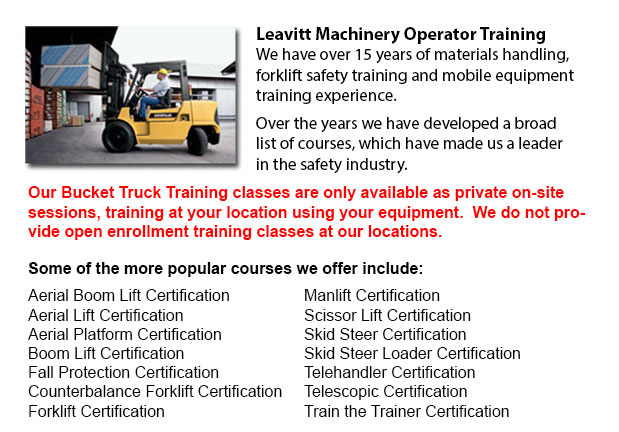
Coquitlam Bucket Truck Training - The Vehicle-Mounted Aerial Work Platform or bucket truck training program is designed to reduce the possibility of personal injury and incident while working in close proximity or with bucket trucks by efficiently training operators who are qualified. An aerial lift device is any vehicle-mounted device, telescoping or articulating, or both, which is used to position personnel to reach locations that would otherwise be not accessible. Aerial lift devices are made use of in order to elevate employees to above-ground work locations.
The program aims to provide operators with the skills, knowledge, training materials and abilities required to be able to safely and efficiently operate vehicle-mounted aerial work platforms.
The program has two portions: a hands-on session and a classroom training session. To become certified, participants should be successful in both parts. A full-size certificate and a wallet-size certificate would be issued upon completing the program.
The kinds of lifts examined in the program include Aerial lift devices are often made of wood, metal, fiberglass, reinforced plastic or other materials.
Definitions
Articulating boom platform: has two or more hinged boom sections.
Extensible boom platform: has an extensible or telescopic boom.
Platform: part of the aerial device which is designed to carry employees.
Mobile unit: a combination of aerial devices, like for example its vehicle and related machine.
Employers have the responsibility to make sure their worker get correct training prior to operating aerial devices. Employees should make certain they likewise acquire the needed training and that they do not operate lift devices if they are not authorized to do so. Workers must ensure that they wear the proper protective equipment if working from the platform.
The course content utilized in the bucket truck training program includes the operation of the vehicle-mounted aerial work platform, pre-shift inspections, safe operating practices, lifting capacity, use of emergency controls, and administering practical and theory tests. Operators will know rules under the federal and local regulations.
-
Coquitlam Crane Certification
Coquitlam Crane Certification - The Crane Certification training program consists of subject matter recommended by industry concerning the safe and efficient operation of cranes. Trainees will be taught the following: how to identify cranes and their... More -
Coquitlam Crane Training Courses
Coquitlam Crane Training Courses - A crane is a kind of equipment designed to move, lift and lower heavy stuff. A crane is usually equipped with a hoist, sheaves, and chains or wire ropes. Cranes are used in the manufacturing, construction and transp... More -
Coquitlam Boom Lift Safety Training
Coquitlam Boom Lift Safey Training - Boom lifts are a kind of elevated work platform or aerial lifting device which are usually used in industry, warehousing and construction. Boom lifts can be utilized in virtually any setting due to their versatili... More -
Coquitlam Boom Lift Training
Coquitlam Boom Lift Training - Aerial platforms or also known as elevated work platforms are devices which allow workers to carry out duties and tasks at elevated heights that would not be otherwise reachable. There are different aerial lifts availab... More -
Coquitlam Forklift Certification Schools
Coquitlam Forklift Certification Schools - Forklift Certification is mandatory within North America. Hence, forklift training programs are important both for businesses and for people looking for jobs in industries as operators of forklifts. Forklift... More -
Coquitlam Wheel Loader Training
Coquitlam Wheel Loader Training - Normally, the different types of heavy equipment training are divided into 2 categories of equipment: those that have rubber tires and tracked vehicles. Tracked vehicles include items like for instance bulldozers, ex... More -
Coquitlam Heavy Equipment Training Schools
Coquitlam Heavy Equipment Training Schools - There are a lot of heavy equipment training schools to choose from. If you would like to get to the best, it is important to examine several factors of the school to be able to determine the level of educa... More -
Coquitlam Telehandler Training Courses
Coquitlam Telehandler Training Courses - Employers are responsible for making sure that their supervisory and operating personnel are trained to work proficiently making use of telehandler equipment. The skill level of workers should be assessed. If... More

Forklift Certification Coquitlam
TOLL FREE: 1-888-254-6157
Coquitlam, British Columbia
forkliftcertificationcoquitlam.com
Email Us
About Us


